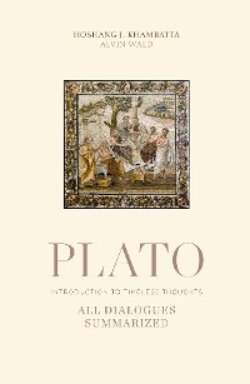Читать книгу PLATO - Hoshang Khambatta - Страница 14
3 Crito
ОглавлениеOverview: Socrates’s friend Crito argues that the state was wrong in convicting him and sentencing him to death. He proposes to pay off the jailors to allow Socrates to escape and live in exile elsewhere. Socrates presents numerous arguments to the same point, that doing one wrong to correct another wrong is never right. Socrates tells Crito that as a citizen he enjoyed all the privileges that Athens offered him and his family, and that in return he must observe the laws of the city and must accept the city’s judgment. Finally, they both agree that this outcome is also the will of The Gods. Elements of Plato’s arguments can certainly be found in Christian philosophy, for example, “turning the other cheek.”
Socrates has been found guilty and sentenced to death. However, the death sentence cannot not be carried out as the laws require that the Athenian state galley must be in port when an execution is carried out. This ship is now on an annual religious mission to the island of Delos.
Socrates’ friend, Crito, visits him in prison early one morning. Crito informs him that he has some very bad news: The state galley will arrive the next day, and therefore the death sentence will be carried out on the following day. Socrates tells Crito that he is ready for death.
Crito tells Socrates that he has enough money to bribe the jailor, and two other friends have promised more funds to help free him so that he can escape to another city. Crito adds that people might think that, if he did not offer help, he valued money more than his friend. Socrates advises him that he should pay no attention to the opinions of other people. Crito then expresses concern that some informers would let the authorities know of such an escape plot. Such an accusation would subject all of the friends to a court case, confiscation of their property, and imprisonment, but they still urge Socrates to escape. Socrates tells Crito that he has thought about this possibility as well as many other things. Crito replies that he has friends in Thessaly who would be glad to welcome Socrates, and implores him not to give up his life. Crito reminds Socrates that he has young sons to bring up and educate, and without their father they will become orphans. Socrates tells Crito that he very much appreciates his eagerness to help but that in his usual manner he would like to examine all the alternatives and come to a decision on his own. Socrates tells him that he values the opinions of all men. Good opinions can come from wise men and bad opinions from foolish men. A person should consider opinions only from men who are well versed in the subject.
Socrates now begins to examine the question of escape. Should he go against the wishes of the Athenian people as expressed by the jury that convicted him? First, he asks Crito if he would agree that no one should ever willingly do a wrong or, he adds do a wrong thing in one instance and not in another? He emphasizes that what ever the conditions, doing wrong is shameful. Crito agrees with this philosophy. Socrates then rephrases his argument: while a person must never do wrong, but, if a wrong is done to someone then that individual must not retaliate by inflicting wrong on the perpetrator of the original wrong. Crito again agrees with this moral judgment. Socrates then asks Crito to consider carefully whether his beliefs allow him to agree with these principles. He points out that many other men would not agree, as they hold opposing views. Socrates states his contention that a man should never consent to doing wrong or to return a wrong in response for a wrong to himself. Crito once again agrees. Socrates tells him that if he does agree, then he should always follow this principle and not just on occasions that suit him. After Crito agrees to everything that Socrates is telling him, Socrates asks him, how he would answer the Athenian state if Socrates goes against the jury’s verdict and escapes from the city. As Socrates could not say that the verdict was unjust: “therefore I, Socrates, would respond with another wrong.” Socrates repeats that he is duty bound to follow the laws of the city under whose protection he has lived his entire life, enjoying its comforts, and bringing up his children. This viewpoint is his moral contract with the city. Thus escaping from the jail and seeking asylum elsewhere would be doing wrong. Furthermore by living in exile a person becomes subservient to a different set of people. Finally, Crito concedes to Socrates’ arguments and Socrates replies that The Gods are showing him this path.
